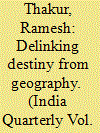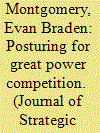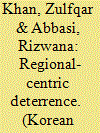|
|
|
Sort Order |
|
|
|
Items / Page
|
|
|
|
|
|
|
| Srl | Item |
| 1 |
ID:
108578


|
|
|
|
|
| Publication |
2011.
|
| Summary/Abstract |
The November 2008 terrorist attacks in Mumbai are analysed through six changing equations in India-Pakistan relations. The balance between military response and inaction is shifting towards the former. India has a vested but no longer critical interest in a strong and stable Pakistan. Pakistan's deniability has been based on separation between the government, army, ISI and terrorists whose plausibility is fading. To reverse the worsening security situation, Pakistan's military must be brought under full civilian control. Failing that, India will have to acquire the military capacity and political will to destroy the human and material infrastructure of terrorism in Pakistan. Finally, the rewards for Pakistan's contributions to the war on terror in Afghanistan exceed penalties for its fuelling of terror in India. The structure of incentives and penalties must be reversed.
|
|
|
|
|
|
|
|
|
|
|
|
|
|
|
|
| 2 |
ID:
187387


|
|
|
|
|
| Summary/Abstract |
Ukraine is existential to Russia, but peripheral to American interests. The “escalation dominance” advantage is with Moscow, and no amount of military aid or economic coercion, short of an actual war, will deter Moscow, given the asymmetry of interests and differing threat perceptions. American public opinion remains firmly opposed to risking a potential great power war. That said, a Ukraine—if it exists as a state after the war—at peace with its neighbours is in everyone’s interest, as is a decreased risk of a great power conflict. This policy brief identifies some confidence-building measures that might, in a similar situation in the future, result in a more realist grand bargain. A potential war might be a short punitive campaign by Russia, in which case the central thesis of this policy brief, a neutral zone in Ukraine, will remain intact. It might also be a war of occupation and conquest, in which case this paper might be considered a study in a counterfactual history of what could have been.
|
|
|
|
|
|
|
|
|
|
|
|
|
|
|
|
| 3 |
ID:
188256


|
|
|
|
|
| Summary/Abstract |
The United States has adjusted its nuclear posture recently by adding nonstrategic weapons to its arsenal and raising the prospect of nuclear retaliation for nonnuclear attacks against command-and-control systems. Critics argue the former change is too dangerous due to the discrimination problem, while the latter change is too draconian due to the proportionality problem. I argue instead that new capabilities introduce a magazine depth problem, while new threats introduce an opportunistic aggression problem. This suggests that changes in force structure are not as dangerous as critics suggest, while changes in declaratory policy are more dangerous than they realize.
|
|
|
|
|
|
|
|
|
|
|
|
|
|
|
|
| 4 |
ID:
125253


|
|
|
|
|
| Publication |
2013.
|
| Summary/Abstract |
It is generally believed that a stable nuclear deterrence averts wars between nuclear adversaries, and makes peace secure. This conceptual argument has merit in terms of the prevention of all-out war; but it does not fully address the need to prevent the outbreak of a limited war between two nuclear weapon states. India and Pakistan have already fought one limited war, Kargil, in a nuclear environment. These two relatively new nuclear weapon states rely on nuclear deterrence to address the external threats. While frequently occurring conflicts demonstrate this, a recurrence of limited war cannot be ruled out in this crisis-ridden region, which would be fraught with significant dangers of escalation. Using a qualitative research approach and deploying a structural deterrence theory as a conceptual guiding tool, this paper investigates the nuclear future of the region, including the prospects of war, conflict termination strategy, escalation control, escalation dominance mechanisms, and finally suggests some pertinent lessons for crisis stability.
|
|
|
|
|
|
|
|
|
|
|
|
|
|
|
|
|
|
|
|
|